I am assuming David Cameron’s ‘plans to “help” more Muslim women to speak fluent English’ were supposed to come across as a positive move? How can this education programme be seen as anything but positive when learning the country’s language is such an important tool for empowerment and social inclusion? Several commentators have made this case. Haroon Moghul for example supports the initiative as it would help Muslim women ‘become that much more politically successful and economically mobile. It’s discrimination, sure, but a positive kind.’ Similarly, Anna Rhodes argues that ‘Deportation after a period of time if you do not learn the language is a harsh, but effective, way to ensure that people are gaining the skills that they require to live and contribute to British society.’ So, why the backlash?
Well to begin with, an initiative aimed at one section of the community alongside a threat of deportation doesn’t help. After all, Cameron did not say “migrants,” he specifically singled out “Muslim women.” This all comes across as quite racist and marginalizing and it is debatable whether or not English language skills (or the lack of them) provides any causal effect on combatting extremism. Sayeeda Warsi, a Tory peer and former party co-chairman, noted that ‘“evidence suggests gang culture, Islamophobia, [and] responses to foreign policy are greater drivers of radicalisation” than failure to learn English.’
I believe that those arguing that it is a good thing have missed the point about how this has been presented. Charities such as JANTrust have been working with women to improve their language skills and specialize in integration into society. Were they consulted? Were any Muslim women who work within this area consulted on the effectiveness of this type of initiative on preventing extremism? The issue with the headline and statements isn’t about whether learning language is a good thing, it is about targeting a specific group with a threat of deportation in a show of combatting extremism, with no evidence presented that language skills have any link to extremism in the first place. The stereotypical representation that is repeatedly presented by the media and politicians reinforces exactly the reason why the virtual exhibition Muslima, which seeks to showcase Muslim women’s art and amplify their voices, involved a study to analyse the depiction of Muslim women in the media in ‘a world that’s grown accustomed to denying the rich diversity of Muslim women’s thoughts and contributions…and reducing them into an easy stereotype of an oppressed group’
This is not to say that there are not many, many problems in the Muslim community, but Muslima’s findings show an obsession with how women look and what they are wearing, that they are always the victim; voiceless, submissive and oppressed and that they are depicted as ‘all the same’.
Muslima, MMW and other groups working to combat stereotypes about Muslim women are campaigning and contributing to show the world that Muslim women are more diverse than what is portrayed. If we support one another with our own representations in society, eventually our words, thoughts and images might just make it into the mainstream. But our efforts have to work against the dominant narrative – the narrative represented in an article detailing Cameron’s plan which was accompanied by a government source saying, ‘David knows that the traditional submissiveness of Muslim women is a sensitive issue’.
The Twitter community responded under Shelina Janmohamed’s #traditionallysubmissive hashtag. Janmohamed, who has been recognized one of the most influential Muslim women in the United Kingdom, tweeted: “I bought a sports car and published a book (in English and eight other languages). I must be doing this wrong #traditionallysubmissive.” The hashtag was quickly picked up by other Muslim women:
The response on social media makes a mockery of the “traditionally submissive” statement, however the constant misrepresentation of Muslim women is no joke when there has been a 300% rise on attacks on Muslims, and when ‘most victims of the UK hate crimes were Muslim girls and women aged from 14 to 45 in traditional Islamic dress.’ Now to get things straight, I am British, yet because I choose to cover and sometimes wear the Islamic dress, I have become a homogenous Muslim woman. Do these ‘mainly white males aged from 15 to35’ who predominantly commit these attacks on Muslim women ask first about heritage, birth-place and views on extremism to at least give a chance to use the English language? No, I didn’t think so, so yes we are very much depicted as ‘all the same’ especially if we choose to cover. By choosing this ‘clumsy and simplistic approach’, Cameron is reinforcing this image and putting us at risk, leaving this initiative looking like a cheap trick for headlines that is better suited to the tabloids, not the Prime Minister of a supposedly proud multicultural country.
Instead of conversing with exactly the community that could help to tackle extremism, Cameron’s new policy is in danger of alienating them further. As Deborah Orr argues, ‘what they are actually doing is placing individual women at the centre of vast geopolitical problems.’ And once again, the image of the covered Muslim women is being used as the source of the world’s problems.
In The Independent and The Guardian’s articles on Muslim women, the image of a veiled woman in Islamic dress is repeatedly used. This overused stereotype and its negative connotations are creating more barriers for Muslim women in society than a purported language barrier. That is why I do not agree with Moghul’s comments that Cameron’s plan benefits Muslim women, and will ‘…help them become that much more politically successful and economically mobile.’ That only works if the group can shed the stereotypical image that is consistently projected on to it.

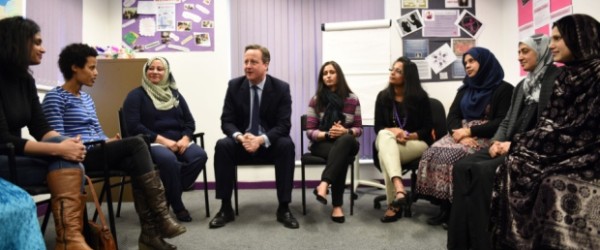
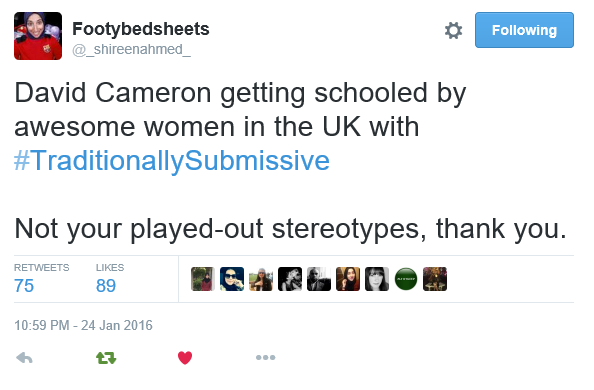
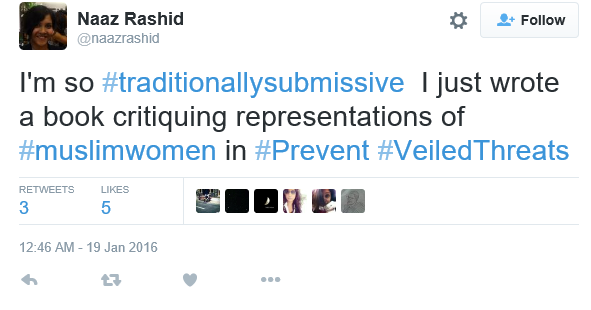
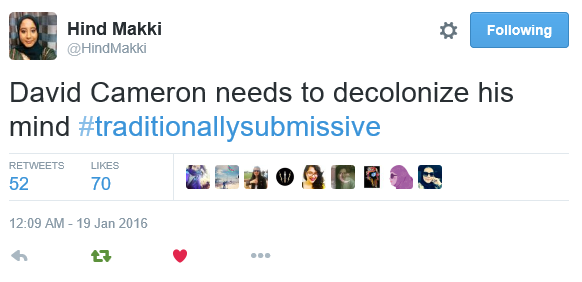
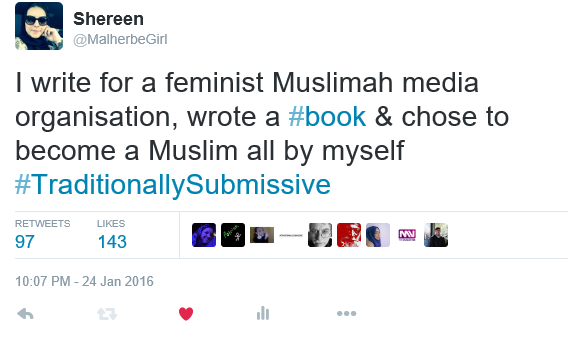
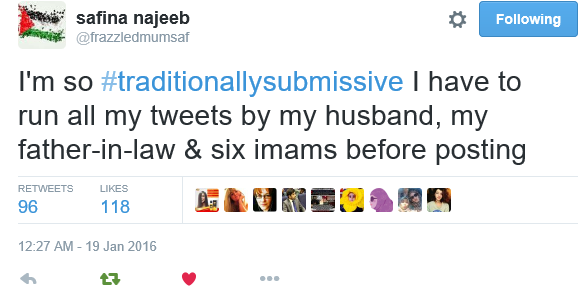



1 Comment
[…] To read the full article visit Muslimah Media Watch […]